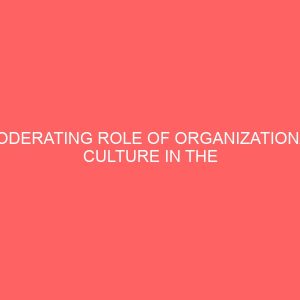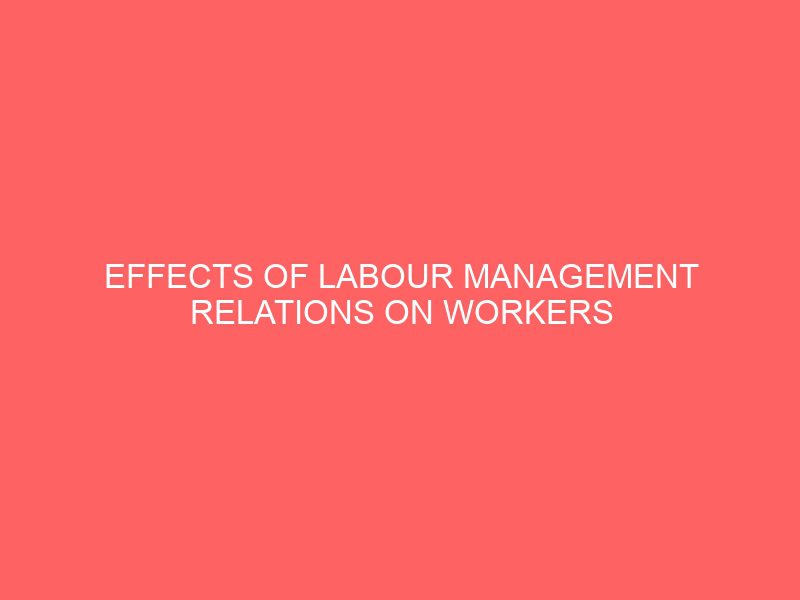Description
CHAPTER ONE
INTRODUCTION
1.1 BACKGROUND OF THE STUDY
In the work place, we have the workers and management team in the organization engage in formal relationship, which is purely for operational purposes. The relationship between the management and workers contractual, which is that the employer-employee relations.
Every organization has some set objectives which it wants to achieve, and these objectives cannot be achieved without an effective cordial relationship between labour and management, these objective: high productivity, large market size and increased asset base. The success of an organization is not only measured by the amount of profit the company can make, but also by the degree of industrial peace and harmony that can be maintained, therefore employers of labour must pay more attention to the needs of labour, so as to maintain high productivity. Management having been entrusted with the day running and administration of the organization should regard and treat employees as a vital and essential asset of the organization; employees on the other hand should try to appreciate the effort of management in trying to protect the interest of investors and shareholders.
Labour and Management are faced with many difficult challenges: In an organization, management set goals and targets which it must meet, so they employ men and women from different background to help meat these goals and target. Most often these individuals goals and targets tend to conflict with the organization’s goals and sometimes the goals of the individual worker in the organization conflict with one another, there is therefore bound to be disagreement, disparities, dis-cordination and conflict which vary from minor differences of opinions to intensive discord.
The problem of low productivity in an organization occurs when there is no cordial relation between management and its workers; this brings about lack of understanding thereby preventing management and workers from achieving their goals, in such a situation there is usually low productivity, no staff morale, low pay, lack of promotion and no maintenance culture.
The swift-moving of current information, knowledge and skills, continue to increase the difficulty for management to keep up and advance with new development in an organization. It is tragic to note that employers are not aware of the effect of lack of communication to productivity, if information’s are communicated effectively to the employees, it will help them to put their effort in the right direction and prevent waste, information should flow freely from the lowest in the organization to the highest, it is important that workers know at all times what is going on if they are to work happily and confidently.
Workers should be motivated if the best is to be expected from them, money alone does not motivate a worker, job satisfaction and secured tenure of office are equally necessary if not more important (E.I.O. Osundele). The problem of monopolizing decision making by management disrupts peaceful co-existence of labour management relations. Nel (2002) said that industrial democracy is important to workers because it result in an increased share in the control of the organization, management should see workers participation in decision making as a way of increasing the commitment and control of workers. As a result of all these one can easily appreciate the need for a good labour- management relation, if high productivity must be maintained.
1.2 STATEMENT OF THE PROBLEM
The problem of the study is to determine the effect of labour management relations on worker’s productivity in Power Holding Company of Nigeria (PHCN).
For employees to be productive in an organization, there need to be mutual satisfaction and dedication of the group that constitute the human side of the organization, unfortunately most organizations fail to achieve this mutual satisfaction and peaceful co-existence that they end up producing below expectation.
When the organizational goals and individual goals are not compatible, it brings about conflict and disharmony which can result to strike. Strike brings frustration to management and causes unnecessary waste that will interfere seriously with the total organizations accomplishment.
Organizations where there is poor labour management relations ends up producing below expectation, the cause of this as earlier mentioned are lack of communication between management and labour, bad leadership from management, poor motivational skills and lack of workers participation in decision making, since the major objective of PHCN is to generate, transmit, distribute, and market electricity to all its customers with least interruption, it has tried to an extent to maintain a fair labour management relation, yet the productivity in this organization is still low because fair labour management relation is not enough. For consumers to get electricity with least interruption, the workers must perform well, and for workers to perform well there must be an adequate mutual relationship between them and management, so PHCN is experiencing some problems of poor labour management relations.
1.3 OBJECTIVES OF THE STUDY
The major objectives of this study include:
- To ascertain the effect of a mutual relationship between management and employees.
- To highlight the effect of motivation on workers productivity.
- To determine the importance of labour management communication.
- To examine the need for workers participation in decision making.
- To ascertain the effect of strike on organizational productivity.
- To examine whether or not leadership style effect labour management
relations.
1.4 RESEARCH QUESTIONS
This research study will find answers to the following research questions at the end of the investigation.
- Does a mutual labour management relation have any effect on workers productivity?
- What is the effect of motivation on workers productivity?
- Does good communication enhance smooth labour management
relations
- What is the importance of employee participation in management decision making?
- What are the effects of strike on organizational productivity?
- How does the leadership style of an organization affect its labour management relations?
1.5 HYPOTHESES FORMULATION
The following hypotheses have been formulated:
- H0: Mutual labour management relations does not have any effect on worker’s productivity.
H1: Mutual labour management relations have an effect on workers productivity.
- H0: There is no need for worker’s participation in decision making.
H1: There is need for worker’s participation in decision making.
- H0: Strike has no effect on organizational productivity.
H1: Strike has an effect on organization productivity.
1.6 SIGNIFICANCE OF THE STUDY
The benefit of this study is as follows:
- It will help the labour and management of an organization to know the areas they are performing well and also loopholes they need to attend to:
- It will help management to know what it entails to improve productivity in an organization.
- This study will help management to know the benefit of relating well with its workers.
- This study will motivate other researchers to go into further study on the issue.
- The information contained in this study will be of immense value to students, management and the general public.
1.7 SCOPE OF THE STUDY
This study attempts to examine the effects of labour management relations on workers’ productivity in an organization.
The data for the study will be obtained from power Holding Company of Nigeria (PHCN), basically its business unit, the Ogui business unit at Okpara Avenue, Enugu.
1.8 LIMITATION OF THE STUDY
An obvious limitation to this study was financial constraints, this study proved to be very demanding on the researcher because of the need to source for materials from PHCN.
These materials needed where gotten from the mangers and public relations officer of PHCN, and it was not easy meeting them at the office, talk less of them having enough time to get you the needed materials, this project was also time consuming
1.9 DEFINITION OF TERMS
- Labour: The people who are available to perform work. The collection of people who work or perform the work of an organization.
- Management: Is a group of people responsible for running an organization or directing the organization’s human activities for specific ends, they take care of the process of planning, organizing, directing and controlling of human activities.
- Performance: The way a job or task is done by an individual, a group or an organization.
- Productivity: Is the measure of the relationship between the quantity of results produced and the quantity of resources required for production, production is the measure of the work efficiency of an individual, work unit or an entire organization.
- Organization: Is a group of people brought together for the purpose of achieving certain objectives.
- Conflict: A condition that arises when two or more individuals or group of people perceive their own interest as being challenged by others and where strong feelings can be aroused.








Reviews
There are no reviews yet.